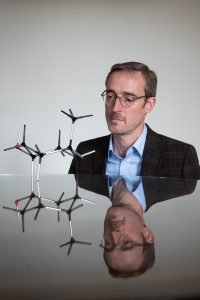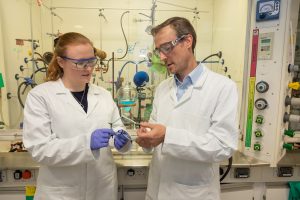Chemistry was the subject studied and taught by Dorothy Hodgkin, one of our most notable alumnae. Now, Sue Scollan (née Green, 1978, Chemistry) and her husband Kevin have made a transformative gift to secure the future of the subject here and establish the Sue and Kevin Scollan Fellowship in Organic Chemistry.
In this piece originally published in the 2019 Report for Donors, Professor Jonathan Burton, the newly retitled Sue and Kevin Scollan Fellow in Organic Chemistry, discusses his teaching and research and explains the importance of the Scollans’ support.
Chemistry is the central science. It has a very broad sweep, extending from theoretical chemistry which is close to physics, to bio-organic chemistry which uses chemistry to explore the nature of life.
It gives you a molecular view of the world. It’s very exciting to understand what molecules do and how to control their reactivity. This has numerous real-world applications in, for example, the pharmaceutical and agrochemical industries.
Organic chemists study the chemistry of carbon, the element that life is based on and when that does new and curious things it opens up new avenues for research. One of the areas we are working on at the moment involves molecules where there are three bonds from a central oxygen atom to three different carbon atoms and the oxygen atom is positively charged.
These ‘oxonium ions’ are chemically interesting and generally pretty reactive. While simple versions of these molecules are well known, a number of much more complex oxonium ions have surprisingly been proposed as intermediates which nature may use to make lots of natural products.
This piqued our interest and we have recently been able tomake a number of these complex intermediates and havefound that they can be simply transformed into an array of molecules.
These molecules belong to a class of natural products which have some interesting biological activities ranging from acting as defence mechanisms for the algae that produce them, to being antibacterial, antiviral and cytotoxic compounds (compounds that are toxic to cells).
An interest in chemistry runs in my family. Although neither of my parents went to university, my maternal grandmother studied chemistry at Bedford College, University of London, in 1926, and achieved a First; I have her degree certificateon my wall at home. I remember asking her for help with some of my A-level chemistry problems and she is certainly someone I greatly respected, and I think of her frequently.
My school was amazing and promoted the idea of competitive learning – a very healthy competition in which everyone took part. I doubt I would now be an academic at Somerville teaching and conducting research in organic chemistry if a friend of mine at school had not suggested I apply to Oxford – I am very grateful to him.
You need to really want to study chemistry as it’s a full-on degree involving both theoretical and practical aspects. I think many people get into chemistry through the practica side of the subject which I find very exciting. When you know enough theory to be able to predict what might happen in the lab in a particular reaction, that is very powerful.
We take about six or seven students a year to read Chemistry at Somerville. It’s a four year course and we teach them for three years and for the fourth year they do a research project. They conduct fundamental research for 9 months and then write a thesis which results in a master’s degree. This fulltime 9 month research project is unique to Oxford chemistry.
As with other subjects, tutorials are central to the teaching of chemistry. The tutorial system means the students gain a whole set of skills they don’t realize they’re acquiring. As we go through problems they’re continually seeing unknowns. They come out with powerful problem-solving skills that are highly transferable to careers beyond chemistry.
The way that the subject is taught at Somerville is that we have two Governing Body Fellows, myself and Michael Hayward, and a departmental teaching fellow Dean Sheppard. Between us we do all of the teaching and there is no exchange teaching with other colleges. We teach thewhole breadth of chemistry and that allows the Tutors to getto know the students; it is a real pleasure both to teach theSomerville chemists and to get to know them.
My research informs my teaching, and it works the other way around too. Sometimes you can be doing a problem in a tutorial and a question a student asks gives you a new way of thinking. This teaming up of teaching and research is very effective.
With my research group, there is a bit of teaching every week, so it is not dissimilar to a tutorial. One of my aims as a DPhil supervisor is that we not only do high quality research, but that my research group are trained in problem-solving and a number of other areas so that they are set up with the necessary skills to be employed in whatever they want to do.
This gift from the Scollans is incredibly generous and completely secures chemistry at Somerville. We are extremely grateful for it. I am especially pleased as it builds on the legacy of Dorothy Hodgkin, our Nobel Prize winner who worked at the interface of chemistry and biology.

